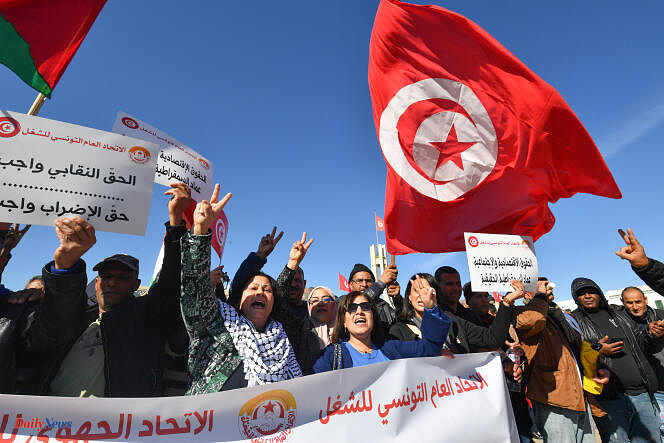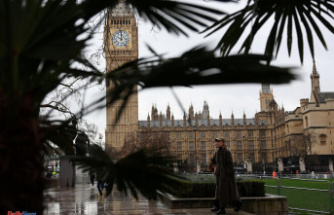Targeted by a complaint from an official of the Ministry of Religious Affairs who accuses him of damaging his reputation, journalist Mohamed Boughalleb was placed in police custody on the evening of Friday March 22, pending being heard by an investigating judge.
Already subject to several complaints from the same ministry, he risks a sentence of up to ten years in prison under Decree-Law 54-2022. This text, promulgated by Kaïs Saïed in September 2022, with the official aim of fighting against the dissemination of “false information and false rumors”, punishable by five years in prison and a fine of 50,000 dinars (nearly 15,000 euros) any person who “deliberately uses communications networks and information systems to produce, promote, publish or send false information or misleading rumors.” The penalty incurred can be up to ten years in prison in the event of defamation against a state official.
Since this legislation came into force, several journalists have been prosecuted for statements made in the exercise of their profession. Tunisian bloggers too. Some have been sentenced to prison terms for expressing their opinions on social networks.
“Offense against the head of state”
Nasreddine Helimi, 42, unemployed, was sentenced on March 7 to seven years in prison by the Kef military court, in north-west Tunisia, for publications commenting on the political situation and criticizing the army : six years under Decree-Law 54 and an additional year for “attack on the dignity, reputation and morale of the army”, according to the code of military justice.
Earlier, in December 2023, the NGO Amnesty International had already expressed concern about an “increase in the number of civilians prosecuted by military courts since July 25, 2021”, the date on which the head of state assumed full powers.
At the same time, blogger and activist Abdelmonem Hafidhi was also tried on March 7 by the Gafsa Court of First Instance and sentenced to six months in prison for “insulting the head of state.” An employee of the Gafsa phosphate company – from which he risks being dismissed following his conviction – this father of four children, particularly active on social networks, was arrested on February 18 at his home and then imprisoned.
An activist since the 2010-2011 revolution and support of candidate Kaïs Saïed during the 2019 presidential election, Mr. Hafidhi has however been critical of the regime since the coup of July 25, 2021. For the Association intersection pour rights and freedoms (Aidl) which looked into this case, the publications in question only reflect the political opinions of the person concerned. She believes that her arrest constitutes “another transgression committed by the Tunisian state and a violation of human rights”.
The same charge of “insulting the head of state” was brought against the artist Rached Tamboura, whose two-year prison sentence was confirmed on appeal on January 31. At 27, this Tunis Fine Arts student and far-left activist was arrested on July 17, 2023 for graffiti painted on a wall where President Kaïs Saïed is described as “fascist” and “racist”. This action aimed to denounce the fate reserved for sub-Saharan migrants then displaced at the Libyan and Algerian borders, in the middle of the desert, without water or food.
The cases of these journalists, bloggers or artists are not isolated. Between July 25, 2021 and January 14, 2024, some 1,484 people were prosecuted for acts related to freedom of expression or their political activities, according to monitoring carried out by the Alliance for Security and Freedoms (ASL), a coalition of Tunisian and international civil society organizations.
Administrations often at the origin of complaints
Among them, more than 1,000 are being prosecuted under the anti-terrorism law, 51 under decree-law 54 and 55 for insulting the head of state, according to Nawres Zoghbi Douzi, coordinator of the ASL, who notes an increase of the use of repressive texts. The people targeted are party leaders, lawyers, judges, journalists, but also citizens without political affiliation. Despite these figures, the Tunisian government assures that “particularly public freedoms [were] more guaranteed than ever” in a note, published on March 23.
The documentation – not exhaustive – of the ASL reveals, however, that the Tunisian administrations are often at the origin of the complaints filed, the ministries of the interior, of justice as well as the Independent Higher Authority for Elections (ISIE) in head. “We underestimated the virulence of the administration which experienced the 2010-2011 revolution very badly. We ask him for accountability or access to information,” says Hatem Nafti, essayist and political analyst, author of the book Tunisia. Towards authoritarian populism? (ed. Riveneuve, 2022).
According to him, Kaïs Saïed and the public authorities would try to reestablish a form of “state prestige” by repressing any dissenting voice. The numerous complaints emanating from the ISIE are all the more problematic, underlines Mr. Nafti, because they target possible presidential candidates like Abir Moussi, leader of the Free Destourian Party (PDL) detained since 3 October 2023, in the run-up to a vote which should be held in the fall of 2024. “It is a sort of revenge from the administration which felt mistreated, while allowing those in power to silence the opponents", analyzes Hatem Nafti.












